De Tsjechische schrijver en politicus Václav Havel werd op 5 oktober 1936 in Praag geboren. Zie ook mijn blog van 5 oktober 2009 en ook mijn blog van 5 oktober 2010 en eveneens alle tags voor Václav Havel op dit blog.
Uit: To the Castle and Back (Vertaald door Paul Wilson)
“I’ve run away. I’ve run away to America. I’ve run away for two months, with the whole family; that is, with Dasa and our two boxers, Sugar and her daughter Madlenka. I’ve run away in the hope that I will find more time and focus to write something. I haven’t been president now for two years, and I’m starting to worry about not having been able to write anything that holds together. When people ask me, as they do all the time, if I’m writing something and what I’m writing, I get mildly annoyed and I say that I’ve already written enough in my life, certainly more than most of my fellow citizens, and that writing isn’t a duty one can perform on demand. I’m here as a guest of the Library of Congress, which has given me a very quiet and pleasant room where I can come whenever I want, to do whatever I want. They ask nothing from me in return. It’s wonderful. Among other things, I would like to respond to Mr. HvÌzdala’s questions.
I’d like to start the conversation with a question that touches on the second half of the 1980s, when you became the most famous dissident in Central Europe, or-as John Keane wrote-“a star in the theater of opposition.” Do you remember the moment when it first occurred to you that you would have to enter into politics, that your role as a playwright, essayist, and thinker would no longer suffice?
In the first place I’d take issue with the designation “star in the theater of opposition.” We did everything we could not to separate ourselves into the “stars” and the others. The better known someone among us became, and thus the better protected from arbitrary repression, the more he tried to come out in defense of those who were less known and therefore more vulnerable. The regime, after all, held to the principle of “divide and conquer.” To some they said: “How can you, sir, an educated man respected by everyone, demean yourself by associating with such losers?” To others they said: “Don’t get mixed up with those guys; they’re a protected species. They’re always going to lie their way out of trouble, and they’ll go scot-free and leave you to pay the price.” It’s understandable that in such circumstances we placed a special emphasis on the principle of the equality of everyone who somehow expressed opposition to the regime.”
Václav Havel (5 oktober 1936 – 18 december 2011)
De Argentijnse dichter, essayist en literatuurwetenschapper Roberto Juarroz werd geboren in Coronel Dorrego op 5 oktober 1925. Zie ook mijn blog van 5 oktober 2009 en ook mijn blog van 5 oktober 2010 en eveneens alle tags voor Roberto Juarroz op dit blog.
Uit: La Treizième poésie verticale
Toujours au bord.
Mais au bord de quoi ?
Nous savons seulement que quelque chose tombe
de l’autre côté de ce bord
et qu’une fois parvenu à sa limite
il n’est plus possible de reculer.
Vertige devant un pressentiment
et devant un soupçon :
lorsqu’on arrive à ce bord
cela aussi qui fut auparavant
devient abîme.
Hypnotisés sur une arête
qui a perdu les surfaces
qui l’avaient formée
et resta en suspens dans l’air.
Acrobates sur un bord nu,
équilibristes sur le vide,
dans un cirque sans autre chapiteau que le ciel
et dont les spectateurs sont partis.
Uit: La Quatorzième poésie verticale
L’abîme n’admet pas l’ordre,
le désordre non plus.
Et nous savons que tout est un abîme.
Pourtant,
le jeu de la feuille et du vent
s’achève toujours à l’endroit le plus exact.
Et aucune feuille ne souille
le lieu où elle tombe.
Il se peut qu’une feuille ordonne
ou peut-être désordonne
une autre face de l’univers.
Vertaald door Silvia Baron
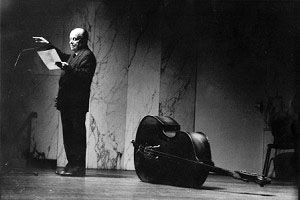
Roberto Juarroz (5 oktober 1925 – 31 maart 1995)
De Zweedse schrijver en journalist Stig Dagerman werd geboren op 5 oktober 1923 in Älvkarleby. Zie ook alle tags voor Stig Dagerman op dit blog en ook mijn blog van 5 oktober 2010.
Uit: A Burnt Child (Vertaald door Benjamin Mier-Cruz)
Look, he whispers.
And the son looks. He sees the cars pulling up around the corner in a long procession. Five black cars in bluish snow. Five black cars relentlessly gliding up to the entrance and gently stopping with snow on their roofs.
Three would have probably been enough, the aunt with glasses whispers so that no one will hear, yet so that almost everyone does.
And three certainly would have been enough, but there had to be at least five black cars for it to be eye-catching. The father adores things that attract attention, and he adores things that are beautiful. So he ordered five.
They have to walk down four flights of stairs to reach the cars. They descend very slowly as if for the last time. The father goes first, then the son, and then the thirteen others. Through the staircase windows they can see the snow falling more and more heavily and draping the hangers on the carpet-beating rack in gray clouds. And if it doesn’t clear up, the cars won’t be visible at all. Now all fifteen of them are silent, no sixteen, for the son’s fiancée meets them on the third flight. She is thin and pale and had trouble getting time off from the clothing shop in Norr Mälarstrand. She has snow on the front of her black coat, snow on her black gloves, and snow on the veil of her hat, so that only her eyes are visible. And she was probably crying. But who knows why?
The black procession glides silently down the stairs. Neighbors open their doors and look on in grave silence. It is a beautiful performance with fine roles. A child begins to cry and cleaves desperately to the wall as though it were looking at death itself.”
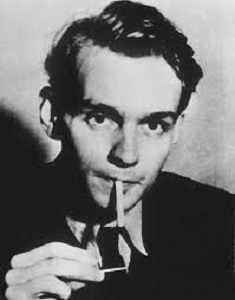
Stig Dagerman (5 oktober 1923 – 5 november 1954)
De Nederlandse dichter, schrijver en journalist K. L. Poll, (volledige naam Kornelis Lubbertus Poll) werd geboren in Dordrecht op 5 oktober 1927. Zie ook alle tags voor K. L. Poll op dit blog.
Wat zich vergeten laat
Wat zich vergeten laat, de wanhoop,
de wil tot vernedering,
de verliezerstranen van de haat.
Mijn lief, mijn boos, verbeten lief,
wij riepen naar elkaar,
tot twee, tot drie, tot vier keer toe,
door de schemer en het sneeuwlicht
van de late winter,
en keer op keer kwamen we terug,
onwillig, gebroken, verliefd.
Uit: Het Meer van de Ondank. Een tijdgedicht
Oktober
1
Een pauw op de schoorsteen en drie op het dak,
in het geelbruine licht van een middagplataan.
Ze maakten de indruk dat niemand ontbrak.
Wij bleven maar kijken, wij bleven maar staan.
Die van de schoorsteen krabde zijn kop.
Zij keken ons tweeën geen ogenblik aan.
Vier trouwe gezanten uit het land van de zon.
Hun fietsende voedster nauwkeurig op tijd.
Het Meer van de Ondank ligt vlak bij Trebon.
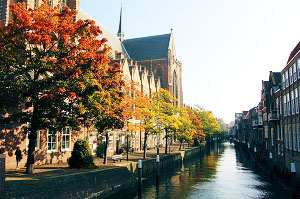
K.L. Poll (5 oktober 1927 – 14 november 1990)
Dordrecht
De Ierse schrijver Flann O’Brien werd geboren op 5 oktober 1911 in Strabane, County Tyrone. Zie ook mijn blog van 5 oktober 2009 en ook mijn blog van 5 oktober 2010 en eveneens alle tags voor Flann O’Brien op dit blog en alle tags voor O’Brien op dit blog.
Uit: Drink and Time in Dublin
„—There wasn’t—all that was stopped because I was supposed to be staying with the brother-in-law. What do I do? On with all the clothes and out to find what time it is and what day it is. The funny thing is I’m not feeling too bad. Off with me down the street. There’s lights showing in the houses. That means it’s night-time and not early in the morning. Then I see a bus. That means it’s not yet half-nine, because they stopped at half-nine that time. Then I see a clock. It’s twenty past nine! But I still don’t know what day it is and it’s too late to buy an evening paper. There’s only one thing—into a pub and get a look at one. So I march into the nearest, very quiet and correct and say a bottle of stout please. All the other customers look very sober and I think they are all talking very low. When the man brings me the bottle I say to him I beg your pardon but I had a few bob on a horse today, could you please give me a look at an evening paper? The man looks at me and says what horse was it? It was like a blow in the face to me, that question! I can’t answer at all at first and then I stutter something about Hartigan’s horses. None of them horses won a race today, the man says, and there was a paper here but it’s gone. So I drink up the bottle and march out. It’s funny, finding out about the day. You can’t stop a man in the street and say have you got the right day please? God knows what would happen if you done that. I know be now that it’s no use telling lies about horses, so in with me to another pub, order a bottle and ask the man has he got an evening paper. The missus has it upstairs, he says, there’s nothing on it anyway. I now begin to think the best thing is to dial O on the phone, ask for Inquiries and find out that way. I’m on me way to a call-box when I begin to think that’s a very bad idea. The girl might say hold on and I’ll find out, I hang on there like a mug and next thing the box is surrounded by Guards and ambulances and attendants with ropes.”
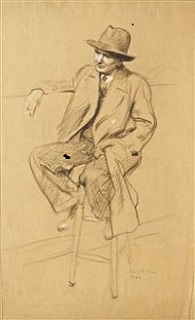
Flann O’Brien (5 oktober 1911 – 1 april 1966)
Portret door Sean O’Sullivan, z.j.
De Franse schrijver, filosoof en kunstcriticus Denis Diderot werd geboren in Langres op 5 oktober 1713. Zie ook alle tags voor Denis Diderot op dit blog en ook mijn blog van 5 oktober 2010.
Uit: Brieven aan Sophie (Vertaald door Anneke Brassinga)
“We spraken weinig, voelden veel en hadden het beiden moeilijk, maar hij was dieper te beklagen dan ik. Ik kon af en toe mijn blik naar de stad richten, zijn ogen waren meestal ter aarde gewend en zochten daar iemand die niet meer is.
We kwamen bij een beeld dat me trof door de eenvoud, de kracht en het sublieme van het onderwerp. Het stelt een centaur voor die een kind op de rug draagt. De tere vingertjes van het kind reiken naar de kop van het brute beest, houden het bij een haarlok, als bij een teugel, vast. U zou het gezicht van de centaur moeten zien, de houding van zijn kop, de verzaligde uitdrukking, zijn respect voor het tirannieke kind naar wie hij omkijkt alsof hij haast geen voet zou durven verzetten.
Een ander beeld dat me nog sterker bekoorde was dat van een oude faun die vol vertedering een boreling in zijn armen houdt. Dat van Agrippina bij het baden valt tegen, maar misschien stond ik op de verkeerde plek.
We deelden onze rondgang in tweeën. Voor het diner bezochten we het laaggelegen deel van het park. We aten met smaak. Onze brave baron was in een dolle bui. Hij is zo origineel.
Stelt u zich een olijke sater voor, spits, losbandig, viriel, te midden van een groepje kuise, delicate, kwijnende gestalten. Zo zat hij in ons midden. Mijn lieve Sophie was door hem niet gechoqueerd of in verlegenheid gebracht, want mijn Sophie is man en vrouw al naar het haar belieft. Mijn vriend Grimm had hij evenmin in verlegenheid gebracht of gechoqueerd, want die gunt de verbeelding altijd de vrije teugel en stoort zich alleen aan grapjes die misplaatst zijn.”
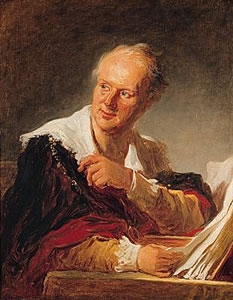
Denis Diderot (5 oktober 1713 – 31 juli 1784)
Portret door Jean Honoré Fragonard, 1769
De Duitse schrijfster Charlotte Link werd geboren op 5 oktober 1963 in Frankfurt am Main. Zie ook alle tags voor Charlotte Link op dit blog.
Uit: Der fremde Gast
„Sie träumte, ein kleiner Junge habe an ihrer Haustür geklingelt. Sie wimmelte ihn ab, so wie sie jeden abwimmelte, der ungebeten vor ihr stand und irgendetwas von ihr haben wollte. Dieses überfallartige Betteln war ihr schon immer ein Dorn im Auge gewesen, sie fühlte sich bedrängt und genötigt, wenn plötzlich jemand auf ihrem Grundstück aufkreuzte und die Hand aufhielt. Meist ging es um einen guten Zweck, natürlich, aber wer wusste schon, ob diese Leute immer ehrlich waren? Und auch wenn sie mit irgendwelchen Ausweisen herumfuchtelten, die sie als sammelberechtigt für karitative Vereinigungen auswiesen, so war es doch einfach unmöglich, so schnell zu erkennen, ob es sich nicht um eine mehr oder weniger gut gemachte Fälschung handelte. Vor allem, wenn man siebenundsechzig Jahre alt war und zunehmend Probleme mit den Augen hatte.
Kaum dass sie die Tür geschlossen hatte, klingelte es erneut.
Sie setzte sich ruckartig im Bett auf, verwirrt, weil das Klingeln aus dem Traum sie diesmal tatsächlich aus dem Schlaf gerissen hatte. Das Bild des Jungen hatte sie noch immer vor Augen: ein spitzes, blasses, fast durchsichtiges Gesicht mit riesigen Augen. Er bat nicht um Geld, er bat um Essen.
»Ich habe solchen Hunger«, hatte er gesagt, leise und doch fast anklagend. Sie hatte die Tür zugeworfen, entsetzt, erschrocken, konfrontiert mit einem Aspekt der Welt, den sie nicht sehen wollte. Hatte sich umgedreht und versucht, das Bild loszuwerden, und in dem Moment hatte es geklingelt, und sie dachte: Nun ist er das schon wieder!“
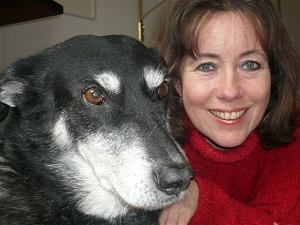
Charlotte Link (Frankfurt am Main, 5 oktober 1963)
Onafhankelijk van geboortedata
De Vlaamse dichter en psycholoog Sven Cooremans werd geboren in Rumst 1970. Gedichten van hem verschenen in “De Brakke Hond” en “Gierik”, kortverhalen in “DW&B”, “Deus ex Machina” en “Gierik”. In 2003 verscheen zijn debuut dichtbundel “Myeline’. Zijn derde bundel “Het is dat of stoppen met zingen” verscheen in het najaar van 2013.
Soms laat een dichter zich kennen
Soms laat een dichter zich kennen,
weegt verlangen een steen, behelst
hem te gooien een booglijn van lucht
in een kamer met niets dan een gletsjer
van lakens en lijven en meer dan hem
lief is de spieren in ogen, ze beide
horen rollen, ondraaglijk glanzend
en groot, de antieke daad nog wat
nat van de doodverf.
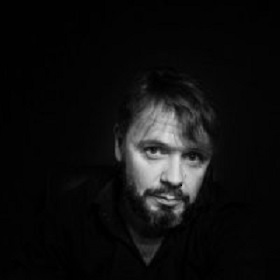
Sven Cooremans (Rumst, 1970)
Zie voor nog meer schrijvers van de 5e oktober ook mijn blog van 5 oktober 2014 deel 2.
